I discovered Tan Cologne through the unlikeliest of circumstances. In my conversation with Danish multi-instrumentalist Trentemøller for the magazine, he casually cited them as an inspiration: “They’re a fantastic duo of two women writing their own music, producing, mastering, just doing everything themselves. Their sound is a little bit like Mazzy Star.” That instantly drew me in. I knew then that I had to listen. As soon as I did, I was floored.
The Tan Cologne duo of Lauren Green and Marissa Macias have recorded together for over half a decade, writing incredibly textured, atmospheric guitar dream pop appropriate for intimate listening. The Mazzy Star comparisons are apt—their vocals rest gently above the lush instrumentation, much like Hope Sandoval’s voice. Elsewhere, the swirling, hypnotic riffage is reminiscent of the Brian Jonestown Massacre. Even then, Green and Macias have created a distinct sonic world, one directly inspired by their New Mexico surroundings more than anything else. That was affirmed during our chat, where they described their music as a “secret we’re sharing,” taking parts of their remote, desertic home in Taos to share with the world.
UNKNOWN BEYOND, their new album, is the most that Tan Cologne has put themselves into their gorgeous music. While their previous albums focused more on their surrounding environment, this one was more spiritual as they faced personal turmoil, retreating to Taos alone and spontaneously writing as a therapeutic outlet. Every song, each responding to this unknown, came to form their most emotive and immersive release. As I spoke to Green and Macias, they constantly added onto each other’s sentences, showing how attuned they are with their music. They discussed how this album differentiates from their other ones, the experience of translating their private music for public audiences and subsequently receiving reception, and the mystery behind their connection with Trentemøller.
With the new record, UNKNOWN BEYOND, I’m wondering what was most different about writing this third album compared to the previous two? Be it recording, writing, or the songs themselves?
Lauren Green: I feel like this one was a lot more intuitive, and we dropped some of the instrumentation that we had from previous albums—we don’t really have lap steel or things like that. It got a little fuzzier, a little more edgy, but it’s still dreamy. It was a lot more intuitive, where if we liked something we recorded, we went with it. We didn’t do it over-the-top by trying to perfect it in any way.
Marissa Macias: It was a comfort to a lot of what we were going through. The album has a lot of different experiences in it. It’s not just one genre or classification; it goes with our emotions, and I think it was a parallel journey to our lives. So that was the intuition, but it was also our outlet and our alternate universe.
LG: Yeah, like a therapeutic alternate universe.
I was about to mention the leveraging of how much you put yourselves into the music. Compared to your previous releases, as you’ve said, a lot of personal turmoil happened during the recording of this one. How much did that influence or shape this set of songs?
LG: I think it was only that with this album, it was just kind of a series of events. When something else happened, it was really just an outlet. We didn’t even think about it. We would be like, “Okay, here’s another song for this event that also happened.” This album was so therapeutic; it’s just a time capsule of that experience, so it’s cool to listen back to it. Like I was saying, there’s a little bit more fuzziness, a little more distortion, and some of that matches those emotions that we were feeling.
MM: Yeah, textually.
LG: Yeah, texture. Mhm.
MM: I think with the other two albums, we kind of had visions of Earth communicating to us through New Mexico or water. This was like, “Okay, we don’t know what’s happening with life. Let’s go to the furthest kind of expanse and try to dissect tangibility or intangibility through sound.”
Your New Mexico surroundings influence you, but there’s almost a more spiritual influence behind this record. Telling stories through the environment and surroundings, as a catalyst, like… Can you explain that a bit more? I just think that’s really interesting with this very atmospheric, textured guitar music. Drawing upon that reference, there’s a sense of groundedness, and a desertic image given the New Mexico landscape. I’d love to hear more about that.
LG: Oh, that’s cool. Yeah, I’m trying to think… I guess it’s kind of what you were mentioning, almost like the fifth element of spirituality. It is very atmospheric, and that’s what we’re focusing on, but it’s almost grounding because of that. You know what I mean? That release. And so, it felt like a really good balance, even though it feels very airy and ethereal. It is almost grounding because of that creation.
MM: I don’t think we could have recorded it anywhere else but here in our space and here in New Mexico. Even if we were having ideas out of state or out of Taos, where we live, recording here really does create our world. We’ve been making this music together for, like, six years. I think that we really have created a very specific sound, and it happens here. It happens like… If that’s cosmic, it’s just cosmic. It happens when we record here, and we write as we record. So, it’s a cool balancing act of listening, learning, and shaping, like it’s a sculpture as we go along.
LG: I was going to say that, too. It becomes part of the process of sculpting the song itself. I think that’s why we like writing and recording ourselves, because that becomes part of the element and cellular memory within it.
MM: As cool as it sounds to be in a studio, it’s another experience, then, to be in our own space, shifting it around, and having thunderstorms happen outside, or lightning strikes, or a sunset, or a windstorm. It’s influencing, ‘cause what we look at and we see, or what we don’t see, really does speak to us.
That’s so interesting, I love that. Even with writing, is it a case of the words or music first, or does it happen very fluidly?
LG: I feel like this album happened more fluidly and we generally start with the guitars first. That’s just always how we’ve written. Sometimes we’ll do everything: drums, bass, keys, and all of it, and then add the vocals, but it depends on the song. As you’ve heard, we like to have the vocals just hover above the music. It becomes essentially like an instrument within itself too, you know? It’s kind of all in the same layer.
MM: And that takes some reminding, when we perform or when we get it played, when we’re out in public or when we get it mastered, we have to remind people, “We’re just vocally on the surface. We’re skimming the waters.”
LG: A mere hover. *laughs*
MM: *laughs* Yeah. We want to feel apart and not like a spotlight on vocals.
When making the new album, what did you find to be the most challenging or rewarding thing when putting it together?
MM: There’s a lot of elements that were really rewarding in this. I feel like it was definitely our alternate reality. Life was so hard for the last year-and-a-half that we escaped here. I don’t know if I’ve ever had that as an artist… In all the elements that I’ve done, that’s an actual escape, and it really was. So I think there was that, and then we started going into the artwork, and
that was really cool too. With our vinyl cover and the way we made it … We usually do everything, we like having it all in our little world. That was neat as well, and it was a way of visually representing the sound we were making. I don’t know, I feel like there’s a lot of hidden things we did, and that’s also exciting because there’s things that, even when we present this to listeners, visually or sonically, there’s still little secrets. And that’s cool.
LG: That’s true. I think you’re totally right on the level of escapism; that was really cool. But on a technicality level, I think we took away some elements that we had before, whether it be different instrumentation, guitar pedals, or effects we found in the music closet and reintroduced in a different way, like tremolo or a little more fuzz. That was really cool too, to rediscover instruments that we have and different ways to use them, and introduce more electronic elements, like a synth, drum machine, things like that. We just put some hints in there, which we hadn’t done before.
MM: We’ve performed for a few years as a duo with a backing track. So it’s interesting because I feel like, live, we already have these electronic experiences that Lauren and I perform with, like beats and the drum machine. This was the first incorporation on a record. It’s a little more holistic, ‘cause we’ve done it that way for years.
LG: Live-wise, we’ll sometimes have a full band. We’ll have drums and bass, but when we do the duo, it turns more into an electronic set in a way, because we’ll replace some of the live drums with beats that we’ve created.
This kind of reflective, vulnerable-sounding music lends itself to private listening, like in solitude. Thinking emotionally, how is it for you two to translate that experience to a live audience?
LG: That’s a really good question. I think sometimes, before we perform or during, we’re like, “Wow, is this meant to be performed live?” And then we’ll hear such interesting and cool interpretations or feedback that we’re like, “Wow, okay. We’re really happy that we have shared this in that way.” But when we record, we add so many layers. We can’t get every single bit of it, which I would love to have like a whole orchestra eventually, you know? *laughs* We try to do the best we can with what we have, but I generally love to hear what people have to say, because it also introduces new bands or projects that I’ve never heard, because people will be like, “Have you heard this? There are elements that remind me of this,” and that’s cool.
MM: I feel like our live experience is also kind of topographic. We take people on a landscape with us, and it can be very stripped-down and electronic, and then go into more of a wall of sound, like awash. And so it does translate. It’s really cool because we most often take people off-guard unless they are really attuned to our music. Our recent tour was in Europe; we were opening for Trentemøller, and that was neat, because I think he was introducing a lot of people to our sound. We heard some cool feedback, and often it was really positive. I think when translating it live, given that it’s just Lauren and I who play every instrument on the album, we would need like eight people minimum, maybe more. *laughs* But translating it into a very, like… I think you can feel the elements when that’s happening. There’s percussion and then there’s us and then there’s vocals. And it’s stripped-down, but it’s also awash. So yeah, it’s a translation. It’s not the same as the album, but I would say it’s maybe similar to how “Cloud of Mirrors” on the new album is. That’s kind of how the set is.
LG: We’re in a pretty remote location in Northern New Mexico. It always feels interesting to take a slither of that out from there. So, taking that out, extracting it, and then sharing it all over the world is a cool experience. ‘Cause I think we both didn’t always think of that element. We just were recording—we love to play, we love to write. Then that started happening, and we were like, “Wow, this is interesting.” You know, it’s almost like a secret we’re sharing, I guess. *laughs*
MM: A different translation. *laughs*
I’m one of those people who discovered you through Trentemøller. When I spoke to him, he said, “Have you heard of this band called Tan Cologne?” It simply came up in conversation, which was very sweet. How did that connection come about?
LG and MM: We don’t even know. *laughs*
LG: We asked Anders on tour, and we were like, “How did you find us?” And he goes, “I don’t know. I was listening to something, it might’ve been…”
MM: Aliens.
LG: Aliens, maybe, yeah.
MM: There’s some sort of transmission that happened.
LG: Yeah, and then he put us on the intro music when he’s about to play and set up, you know, like in venues, he put us on that playlist. And then somehow I think we found that like, “How did this…” And we still don’t know! It’s a mystery.
MM: He first wrote to us a few years ago when our second album [EARTH VISIONS OF WATER SPACES] came out. That was the 2022 one. We were like, “Did we just get this message?” It wasn’t until three years later that we met him, in February, and did two shows together in New York and Chicago. Then he asked us if we’d like to come to Europe, which we just returned from about 10, 12… 14 days ago.
LG: Yeah. Recently. But he’s just such a genuine, positive guy. It’s been really cool to share information and music and all that stuff.
MM: Yeah. It’s neat to explore the fact that it was a mystery that he found us. We’ve connected, and we’re finding out what that is about. *laughs* Yeah. What is it?
That’s so, so lovely. Roping it back to reaching more audiences, just in places you’d never expect—you did the Europe tour, and I’m talking to you from the other side of the world. How have you found that phenomenon?
LG: We get really, really interesting and special messages that make us cry at times. One guy from Spain mentioned he was listening to our music when he was doing his dissertation, and some of our music influenced it. We get really cool things that actually, in turn, influence us back. It’s interesting, as I was saying, just being in a remote location in Northern New Mexico, and even here, we don’t play live here very much. We write here. So it’s cool to go out and other people are like, “Woah, I’ve heard your music or sing the lyrics,” but here, some people have no idea. We play, go to the grocery store, and people are like, “Who are… what’s this?” I kind of like that immunity, I guess, with that. But yeah, the way people have analyzed or found themselves interwoven with our music, it’s cool to hear that feedback.
MM: And it’s also interesting to share such a private experience of ourselves, and then see somebody somewhere far has heard it. It is unreal. That’s a gift, that, like… Wow, you didn’t know you were born to have someone else hear your voice that you recorded in a tiny place in Northern New Mexico. And they’re somewhere very far listening to that. I don’t know, I think it’s magical. It’s really neat. I mean, like, what time is it even there for you? *laughs* Is it the middle of the night?
*laughs* It’s morning. 7:22 a.m.
LG and MM: Oh wow, okay. *laughs*
MM: But is it in the morning tomorrow?
Yes, it’s Wednesday here! It’s Tuesday on your end.
MM: See, so you’re in the future. You’re in the future. That’s cool.
LG: Well, thank you for waking up early for this. *laughs*
MM: And thank you for traveling back in time to meet us. *laughs*
*laughs* Of course, anything for the music. But that’s incredible because the interpretive meanings that come from how other people perceive your art also blossom into their own special reward. Also, maybe by circumstance or subconsciously, the new record happened to be your shortest.
MM: Like in time? The duration?
Yeah, around half-an-hour, whereas the others are over 40 minutes. But maybe it’s that transience, fleetingness, or capturing that spontaneity that you mentioned earlier?
LG: Yeah, I think you’re right. That’s really interesting. Actually, I didn’t even know that. This one actually has one more song than the other albums, so it’s interesting that it’s shorter.
MM: But you know what, our other albums, we had like, six-minute songs. *laughs*
LG: *laughs* That is true. This one has two songs that are maybe only two-minutes-and-45-seconds. But I think you’re right—more of that intuition and the spontaneity within it, then maybe we were just like, “Okay, they’re complete. That song’s complete.”
MM: Yeah. There were two songs where we were just like, “We’re going to record them,” and we did. Actually, we’re relearning one of them to play in our release show coming up in about a week-and-a-half, and we were like, “That is a crazy guitar line! Did you know you did that?” And then we went, “Oh, we actually have to go into the recording and listen.” And so, we went into the recording and said, “That was a one-off,” which is totally not like anything we’ve ever done before. So I do think there was a lot of spontaneity, a lot of “We like it. Let’s not rework it.” We weren’t reworking things too much. It must’ve made things a little bit shorter, but not with a definitive intention.
UNKNOWN BEYOND is out now on Bandcamp. You can follow Tan Cologne for updates over on Instagram!


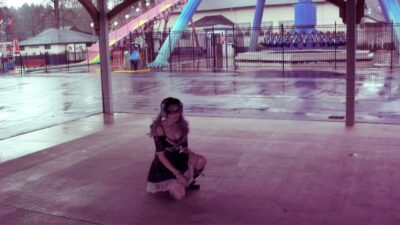

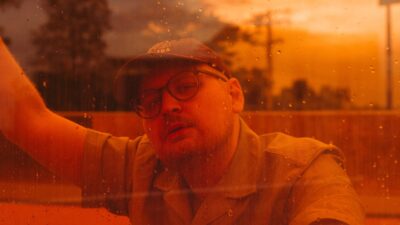
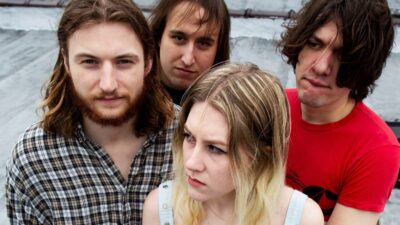

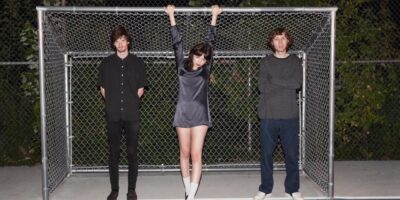

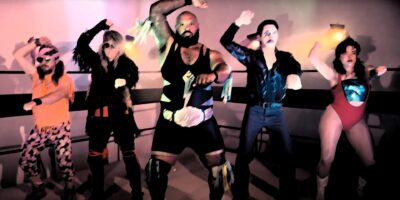
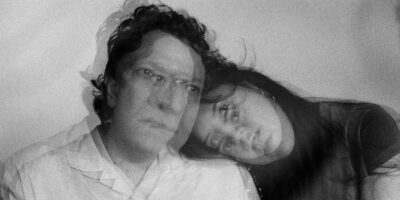





Comments